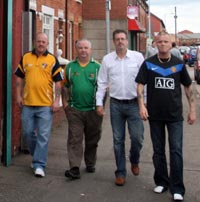27 August 2009 Edition
Teenage convictions set to be overturned

targeted, threatened and tortured: Liam Coogan, Charlie McMenamin, Jim McVeigh and Kevin Mulholland outside the Belfast Coiste na nIarchimí offices
BY LAURA FRIELHUNDREDS of convictions of teenagers secured in non-jury Diplock courts at the height of the conflict are set to be overturned following a series of landmark rulings.
Recently the Court of Appeal has overturned a number of convictions of juvenile defendants who pleaded guilty in no jury courts after signing so called ‘confessions’ during interrogation.
According to the court, confessions extracted from juveniles while unaccompanied by either a parent or solicitor should have been deemed inadmissible. A number of people have already had their convictions quashed and many more have applied for the right to appeal.
The Criminal Cases Review Commission was established in 1997 after a number of high profile cases, including that of the Birmingham Six, heightened public concern about miscarriages of justice. Previously a case could only be referred to the Court of Appeal with the approval of Britain’s Home Secretary and in the Six Counties, the British Secretary of State.
Following the introduction of non-jury courts in the 1970s many hundreds of nationalists faced a conveyer belt of arrest, interrogation and conviction. Around a third of these were juveniles, the vast majority convicted on the basis of statements signed during interrogation.
The case of Charlie McMenamin from Derry set a legal precedent when he successfully overturned his conviction which had been based on a statement he signed as a 16-year-old.
Speaking of his teenage ordeal, McMenamin said that deprived of sleep, threatened and tortured he would have signed anything. During interrogation the boy became so distressed that he cut his own wrists but a doctor deemed him still fit to be questioned.
As in the case of the Guildford Four, vital evidence that would have proven the teenager’s innocence was deliberately withheld from the defence and he was subsequently convicted on the basis of a statement he signed during interrogation.
McMenamin’s conviction was overturned in 2007 and in another landmark, he is expected to receive compensation for the three years he was imprisoned.
“There are people out there just like me who have never spoken about their experiences. Now they have a chance to clear their name and I would encourage others to come forward,” said McMenamin.
In the late 1980s a new wave of repression saw thousands of nationalist homes raided across the north, increased militarisation along the border and intensification of brutality in interrogation centres. From the accounts of detainees a picture of the systematic use of torture during interrogation began to emerge.
Many of the methods deployed by interrogators in the north of Ireland then have subsequently re-emerged in Iraq and Afghanistan today. Methods included hooding, mock executions, suffocation, stress positions, twisting of limbs, sleep deprivation, repeated slapping of ears and head to induce severe headaches, in one case meningitis, dragging by hair or in the case of men by their testicles, death threats, abusive screaming, verbal sexual abuse and the threat of sexual assault.
By the early 1990’s the British began specifically targeting young people. In May 1991 the first in a series of arrests targeting teenagers took place in West Belfast. Over a dozen young people were arrested from the Beechmont area and taken to Castlereagh. Two of those interrogated were 15-year-old school children.
Speaking to AP/RN Kevin Mulholland and Liam Coogan described their ordeal. Kevin was 16 when he was arrested and Liam 18 years of age. Both were taken to Castlereagh. Liam was subjected to 65 hours of interrogation without seeing a solicitor. Both teenagers were repeatedly slapped, particularly about the head and constantly shouted at.
Both were made to stand for long periods of time and deprived of sleep. As a diabetic Kevin was threatened with the withholding of his medication. Both were told they were going to die. Both teenagers were only given access to a solicitor after they signed statements.
In another case, a vulnerable young adult with learning difficulties was told his mother was seriously ill in hospital. He was promised bail if he signed an incriminating statement. Despite his complete innocence, the 20-year-old was coerced into pleading guilty on the basis tha he would be let out in a number of days.
Jim McVeigh of the ex-prisoners’ group Coiste na nIarchimí has also urged anyone who feels their conviction was unsafe to come forward.
“The fact remains that people were advised to plead guilty in front of Diplock Courts or face sentences of up to 25 years. Many young people, under duress signed confessions despite being innocent and as a result spent their formative years in jail,” said McVeigh.
“A number of people have already made legal history by successfully appealing their convictions but there are many more, possibly hundreds who could benefit from recent judgements,” said McVeigh.
Coiste na nIarchimí are urging anyone who feels their conviction was unsafe to contact Coiste directly or go to a solicitor for further advice.



